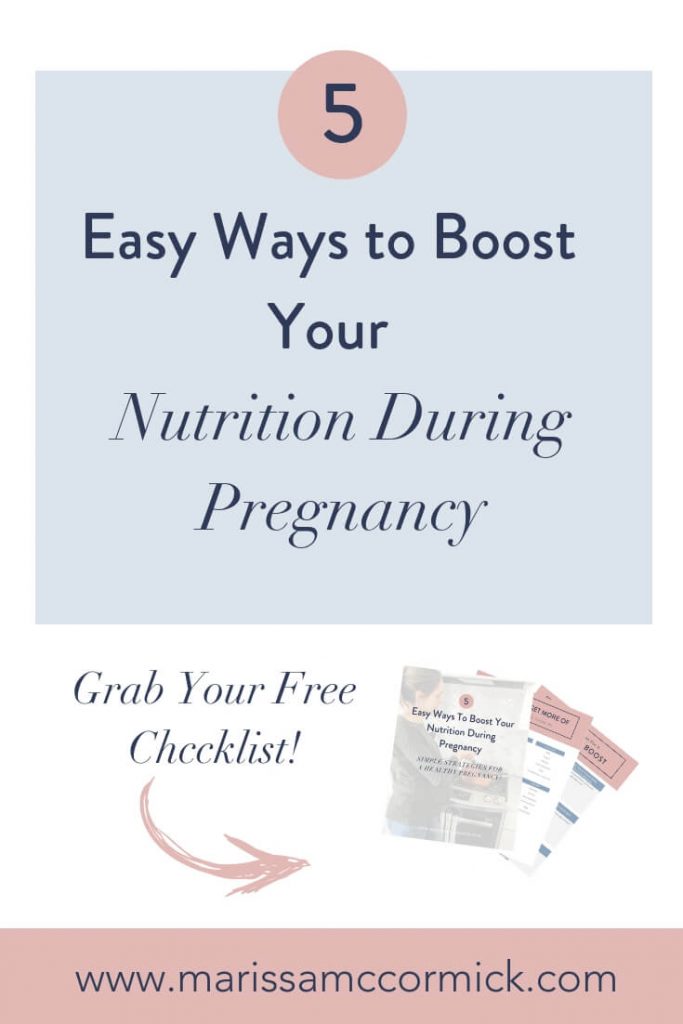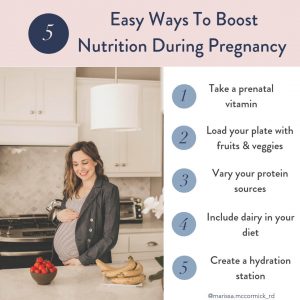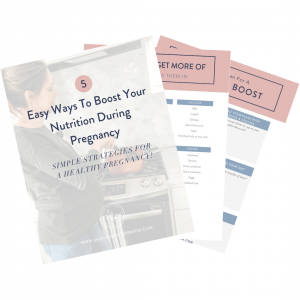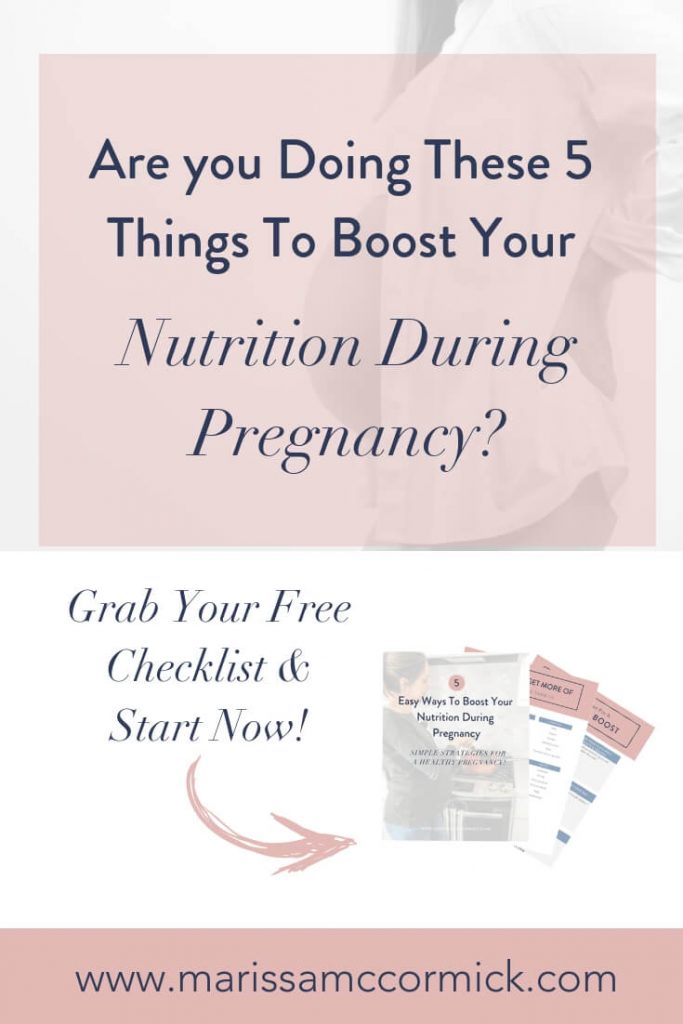5 Easy Ways to Boost Your Nutrition for a Healthy Pregnancy
Yah!! You’re eating for two now… but wait, I’m not talking about calories – sorry mama! I’m referring to all those important nutrients that are critical during this special time of growing your baby.
Alongside the numerous changes your pregnant body is experiencing, your body’s requirements for specific nutrients also increase and become important to meet.
In this post, I list key nutrients of need during pregnancy, alongside respective food choices so you can confidently fill your plate with body & baby friendly food!

Even as a dietitian versed in vitamins, minerals, Adequate Intakes (AIs) and Recommended Dietary Allowances (RDAs), I often find it confusing and overwhelming to know what nutrients and how much I need during pregnancy (I mean who counts all those #’s!!). This is exactly why I’ve created a FREE downloadable checklist which simplifies the nutrients to focus on, food sources to add to your grocery list, and 5 ways easy ways to incorporate these nutrients into your daily life!
Before we dive into the 5 ways to boost your nutrition for pregnancy, let’s first talk about nutrients that increase during pregnancy (bottom line: there’s A LOT!)
Calories:
As your baby grows, so does the need to gradually increase your calorie intake. Although calorie needs increase throughout pregnancy, it doesn’t eating come close to “eating for two!” If you listen to your body, you’ll naturally increase your calorie intake as your pregnancy progresses.
Keep in mind:
- The first trimester does not require any extra calories.
- During the second trimester, an additional ~300 calories a day are recommended.
- For the third trimester, the recommendation is ~400 calories more a day than when not pregnant.
Protein:
Protein recommendations increase from ~50 g per day to ~70 g per day during pregnancy. As your calorie needs increase throughout pregnancy, make sure a portion of those calories come from protein sources like lean meats, fish, dairy, legumes, nuts and seeds!
There’s also a host of specific nutrients that increase during pregnancy!

1. Iron – iron helps deliver oxygen to your body and baby, and also helps ward off shortness of breath, fatigue and headaches. Iron requirements increase to 27 mg during pregnancy. Food sources of iron include: lean meat and seafood . Plant-based iron sources include nuts, beans, vegetables, and fortified grain products.
2. Folate – folate helps with numerous metabolic processes in the body, including support to a growing fetus and prevention of neural tube defects! Folate requirements increase from 400 to 600 mcg for pregnant women. Food sources of folate include: dark green leafy vegetables, fruits, nuts, beans, peas, seafood, eggs, dairy products, meat, poultry, and grains.
3. Calcium & magnesium – calcium and magnesium are important for many bodily functions, including muscular function, hormone signaling and bone structure & development. Calcium and magnesium needs both increase during pregnancy. Food sources of calcium include: milk, yogurt and cheese. Non-dairy sources include vegetables like kale and broccoli. Magnesium is widely found in both plant and animal foods, including fish, yogurt, spinach, legumes, nuts, seeds, and whole grains.
5. Omega 3: omega-3s play important roles in cell membranes, and are important for brain and eye development. Adequate intakes for omega 3’s increase from 1.1 to 1.4 g during pregnancy. Food sources of omega 3 include: fish, flaxseed, soybean, chia seeds and walnuts. The omega-3 content of fish will vary by fish variety, and it’s also important to factor in the need for omega-3s with the risk of mercury. The FDA has put together a nice reference sheet on fish consumption during pregnancy.
6. Iodine: iodine is an essential component of the thyroid hormones and metabolic activity. Requirements increase from 150 to 220 mcg during pregnancy. Food sources of iodine include: seaweed, shrimp, dairy products, grain products, and eggs.
There’s a host of other nutrients needs that increase during pregnancy, including B1, B2, B6 & B12, Vitamin C, A, and choline. Through proper diet and nutrition, you can certainly have a happy and healthy pregnancy. So, let’s dive into some ways to ensure you and baby are being ‘well-fed!’

5 ways to Boost Pregnancy Nutrition
1. Take a quality prenatal vitamin.
It’s obvious by now there are a lot of important nutrients for pregnancy, and a lot of ways to fall short if you don’t have a well-balanced diet. This is why it’s recommended to take a prenatal vitamin to help ensure you’re meeting nutrient needs. Here is the brand I take during pregnancy.
2. Load your plate with fruits & veggies.
Fruits & veggies are rich in a variety of vitamins & nutrients, plus have fiber, nutrients and more! Aim to fill your plate with at least half of it being fruits/veggies.
3. Vary your protein sources.
Different protein sources offer different amino acids and nutrients. Swap in beans or legumes for a meatless Monday, try a fish variety once a week, or enjoy a beef hamburger for a special occasion! Variety is key.
4. Include dairy in your day.
Dairy foods like milk, yogurt and cheese are a fantastic combination of protein, calcium, iodine and other nutrients of need during pregnancy. If you don’t do dairy, or are lactose intolerant, look for dairy alternatives that offer a similar balance of protein and nutrients (usually through fortification).
5. Freshen up your hydration station.
We haven’t mentioned the importance of water and hydration up to this point, but staying hydrated during pregnancy is soo important! Sick of plain water? Try adding fresh berries, lemons, or even sparkling water.
It’s a lot to take it, I know! So grab the FREE CHECKLIST and feel more confident nourishing yourself and baby during pregnancy!

*This post contains links to Amazon.com. As an Amazon Associate I earn from qualifying purchases.
References:
- https://ods.od.nih.gov/
- https://health.gov/dietaryguidelines/
- https://www.fda.gov/Food/ResourcesForYou/Consumers/ucm393070.htm
- https://www.mayoclinic.org/healthy-lifestyle/pregnancy-week-by-week/in-depth/art-20043844

Be the first to comment